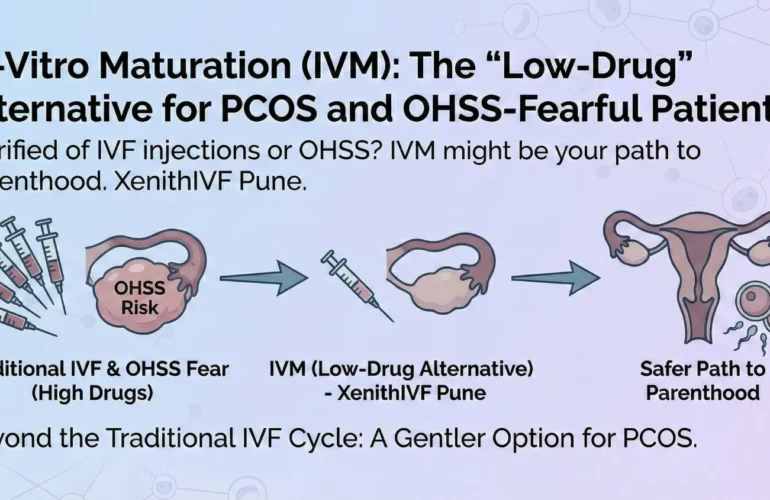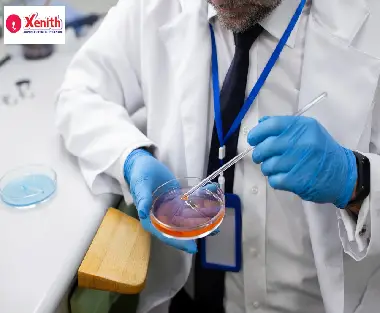If you’re exploring IVF as a path to parenthood, you might have come across the term blastocyst culture. It may sound technical, but at its heart, it’s a method that gives you a better chance of success by allowing your embryos more time to grow before transfer. For many couples, this technique brings renewed hope and clarity in the IVF journey.
Xenith Hope Circle
Join our new WhatsApp community
Table of content
- What is Blastocyst Culture?
- How Does Blastocyst Culture Work?
- Benefits of Blastocyst Culture in IVF
- Who is Suitable for Blastocyst Culture?
- Success Rates of Blastocyst Culture
- Risks and Limitations of Blastocyst Culture
- Blastocyst Transfer vs. Day 3 Transfer: Which is Better?
- Cost of Blastocyst Culture in India
- Why Choose Xenith Clinic for Blastocyst Culture?
- Frequently Asked Questions
What is Blastocyst Culture?
Blastocyst culture is an advanced step in IVF where your embryos are allowed to grow for five or six days in the lab instead of the usual three. By this stage (called the blastocyst stage), the embryos are more developed typically with around 100 cells and more likely to implant successfully in the uterus.

Free Thursday Consultation
Book Your AppointmentThis extra time helps specialists choose the embryos that are growing best, improving your chances of a healthy pregnancy.
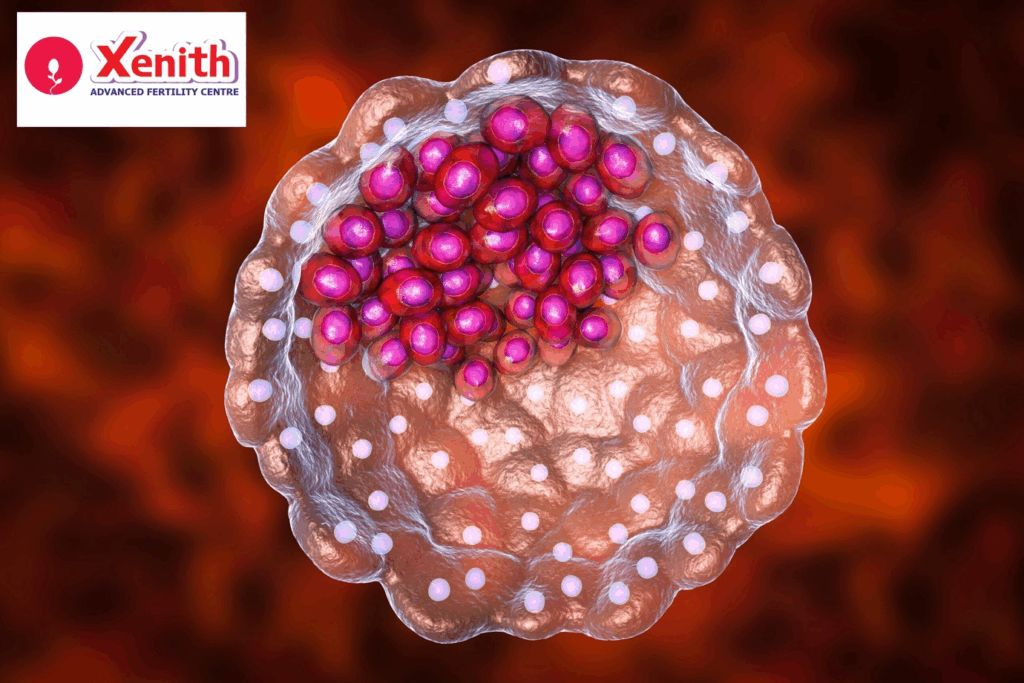

How Does Blastocyst Culture Work?
Here’s a simple step-by-step breakdown:
- Egg Retrieval: Mature eggs are gently collected from your ovaries.
- Fertilization: The eggs are combined with sperm using IVF or ICSI methods.
- Growing the Embryos: The embryos are carefully nurtured in a lab for 5 to 6 days.
- Choosing the Best Embryos: Specialists assess which embryos have grown well enough to be transferred.
- Embryo Transfer: The healthiest embryo(s) are transferred into your uterus usually on Day 5.
Benefits of Blastocyst Culture in IVF
There are some key benefits to this technique:
- Higher Implantation Rates: Embryos that reach the blastocyst stage are more likely to successfully implant.
- Smarter Embryo Selection: Letting embryos grow longer helps identify the strongest ones.
- Lower Risk of Multiple Pregnancies: Fewer but better-quality embryos can be transferred, reducing the chance of twins or triplets.
- Better Timing: Day 5 transfers align more naturally with when an embryo would typically arrive in your uterus.
EXCELLENTTrustindex verifies that the original source of the review is Google. We highly recommend this clinic. Dr Mamta Mam Dr Poonam Mam Dr Pooja Mam are extremely humble and experienced doctors. Their overall staff was very kind ,polite and supportive. We are extremely happy with the treatment and positive report. Thank you so much Xenith IVF to make our dream come true.Posted onTrustindex verifies that the original source of the review is Google. We had a very positive experience at Xenith IVF & Fertility. From the first consultation itself, the doctors and staff made me feel heard, supported, and reassured during what can otherwise be an emotionally overwhelming journey. The doctors are extremely patient, knowledgeable, and take time to explain every step clearly without rushing. I really appreciated the transparency in treatment options and the calm way all doubts were addressed. It helped reduce a lot of anxiety. The nursing staff and coordinators are caring, approachable, and well-organised. Appointments were managed smoothly, and follow-ups were timely. The clinic is clean, hygienic, and well maintained, which added to the overall confidence and comfort. Most importantly, I felt treated not just as a case, but as a person. The empathy and emotional support made a huge difference. I would definitely recommend Xenith IVF & Fertility to anyone looking for professional, ethical, and compassionate fertility care.Posted onTrustindex verifies that the original source of the review is Google. Xenith IVF helped make our dream come true through IVF. I am most thankful to Dr. Mamta Dighe, along with Dr. Pooja, Dr. Reshma for their precise diagnosis, exceptional care and support throughout this process. The sisters Mayuri and Pallavi were kind and attentive. Reception team Kalyani, Samiksha and Sharayu were polite and welcoming thought I thought that at rush hours they need more helping hands to support them. Most of the time receptionist team is busy in peak hours and unnecessary wait may result in frustration. Rest all is very well organised, clean and neat.Posted onTrustindex verifies that the original source of the review is Google. Excellent ivf center. Highly recommended. Dr. Mamta is expert in her domain and consistently positive towards the treatment. Special thanks to her for personal attention to each and every detail. All the treatment process was managed with sincerity and transparency. The entire hospital staff is professional and polite. The reception and administrative staff efficiently handle all appointments and queries with great professionalism. Special thanks to Dr. Pooja for her regular guidance and timely support during emergency situations and for patiently addressing all concerns. Overall, the clinic is highly recommended and 100% trustworthyPosted onTrustindex verifies that the original source of the review is Google. I had a wonderful experience at Xenith IVF. The team took amazing care of us throughout the journey and made us feel supported at every step. Truly grateful and very happy with the experience.Posted onTrustindex verifies that the original source of the review is Google. Best doctor's ever, good experience, all staff are supporting.Posted onTrustindex verifies that the original source of the review is Google. Efficient and well-organized center. Friendly and understanding receptionists; amazing and phenomenal service of the doctors. It has truly been a wonderful experience. Thank you.Posted onTrustindex verifies that the original source of the review is Google. After a long journey, Xenith IVF helped make my dream come true through IVF. I am most thankful to Dr. Mamta Dighe, along with Dr. Pooja, Dr. Poonam, Dr. Reshma, and Dr. Minal, for their exceptional care and support throughout this process. The sisters Ms. Sonia, Ms. Mayuri, Ms. Pallavi were kind and attentive, and the reception team Ms. Kalyani, Ms. Samiksha, Ms. Sharayu was polite and welcoming. The clinic maintains state-of-the-art lab facilities with advanced technology and strict hygiene standards, which gave me confidence throughout the process. I also appreciate their complete transparency in procedures and clear communication at every step, which made the experience stress-free and trustworthy. The team ensures maximum patient comfort and provides emotional support during every stage, patiently answering questions and offering reassurance when needed. Xenith IVF is known for its high success rates and personalized treatment plans, which truly make a difference for couples struggling to conceive. Thank you, Xenith IVF, for your dedication and compassionate approach. I highly recommend Xenith IVF to anyone looking for expert care and a supportive team.Posted onTrustindex verifies that the original source of the review is Google. We extend our sincere appreciation for the exceptional service provided by Xeinth. The doctors, particularly Dr. Pooja, demonstrated remarkable expertise and knowledge, offering invaluable guidance and care throughout our experience. Her ability to address each query with clarity and compassion was greatly appreciated. The entire staff, including the nurses, exhibited a high level of professionalism and empathy, making our journey a positive one. Thank you team. We highly recommend Xeinth for their outstanding care and service.
Who is Suitable for Blastocyst Culture?
This technique is ideal for:
- You have multiple good-quality embryos after fertilization.
- You’re planning genetic testing (PGT), which requires more developed embryos.
- You’ve had previous IVF cycles that didn’t succeed with Day 3 transfers.
- You’re doing a frozen embryo transfer, where precise timing is important.
Success Rates of Blastocyst Culture
One of the key advantages of blastocyst culture is its ability to enhance IVF success rates. By allowing embryos to develop until Day 5 or 6, fertility specialists can observe their growth patterns and morphology in greater detail. This leads to better embryo selection, ensuring that only the most viable blastocysts are transferred. As a result, blastocyst IVF success rates tend to be higher than those associated with Day 3 transfers. The likelihood of implantation increases significantly because blastocyst-stage embryos are more developmentally advanced and better aligned with the natural timing of uterine receptivity.

Risks and Limitations of Blastocyst Culture
As with any medical procedure, there are risks of blastocyst culture to consider:
- Fewer Embryos May Develop: Not all embryos make it to the blastocyst stage. For
patients with few embryos to start with, this could reduce the chances of transfer. - Emotional Stress: Watching embryo numbers drop during extended culture can be
emotionally challenging. - No Absolute Guarantees: Even high-quality blastocysts might not implant due to
uterine or other unknown factors.
Blastocyst Transfer vs. Day 3 Transfer: Which is Better?
The debate around blastocyst culture vs Day 3 transfer continues, but clinical evidence increasingly supports blastocyst transfer as the preferred option. Day 5 embryos are more developed and better synchronized with the uterine lining, which increases the chances of implantation.
Cost of Blastocyst Culture in India
On average, you can expect an additional cost of ₹10,000 to ₹25,000 on top of standard IVF fees. While it’s a bit more upfront, many couples find it worthwhile for the improved outcomes it can bring.
Why Choose Xenith Clinic for Blastocyst Culture?
At Xenith Clinic, we’re here to walk with you every step of the way. Here’s what makes us different:
- Expert Team: Our embryologists and fertility doctors bring years of specialized experience.
- Cutting-Edge Technology: We use advanced incubators and imaging tools to support your embryos’ growth.
- Proven Success Rates: Our blastocyst IVF success rates are among the best in the country.
- Care That’s All About You: We personalize your treatment plan to give you the best possible chance at success.

Blastocyst culture is an IVF method where embryos are grown to Day 5 or 6 before transfer to select the healthiest ones.
It enhances embryo selection and synchronizes transfer with the uterus, improving implantation and success rates.
Higher success rates, better embryo selection, and reduced risk of multiples.
It’s ideal for patients with multiple embryos, past IVF failures, or those undergoing genetic testing.
Blastocyst (Day 5) embryos are more mature and viable, often leading to better outcomes than Day 3 embryos.
Yes, especially in patients with good embryo development and uterine health.
Fewer embryos may reach the blastocyst stage, but this allows for higher-quality selection.
Costs typically range between ₹10,000 to ₹25,000, depending on the clinic and add-on procedures.
Choosing the right IVF approach can make all the difference. If you’re considering blastocyst culture, we’re here to support you with the care, knowledge, and tools you need to succeed.
Why Choose Xenith?
We have years of experience, expertise and the latest reproductive technologies in the area of infertility and treatment plan designed for individual needs. The staff at Xenith is highly trained in the latest embryological, medical and technological know-how as well as counselling and therapeutic communication. We are equipped to offer evidence-based treatment in infertility efficiently.
- Patient-centered care
- Specialty in Recurrent IVF Failures
- Focus on interventions
- High IVF success rates
- High Clinical Standard
- All treatments under one roof
Book Appointment Today!
Recent Posts
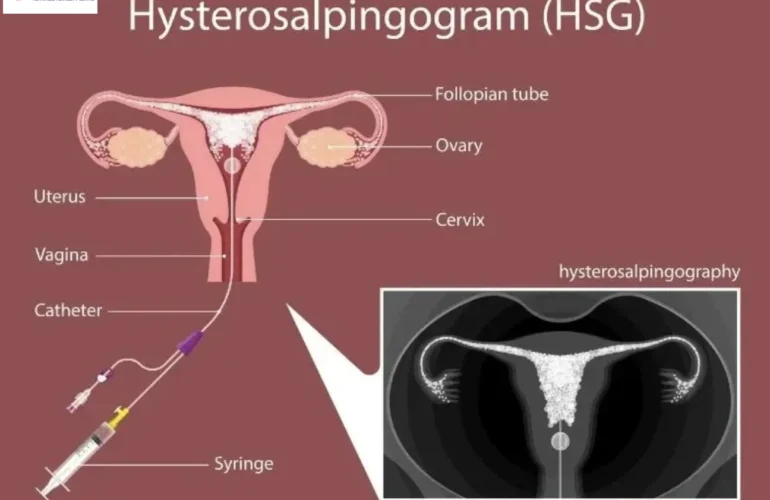
Is the HSG Test Painful? A Patient’s Step-by-Step Guide to Stress-Free Testing in Pune
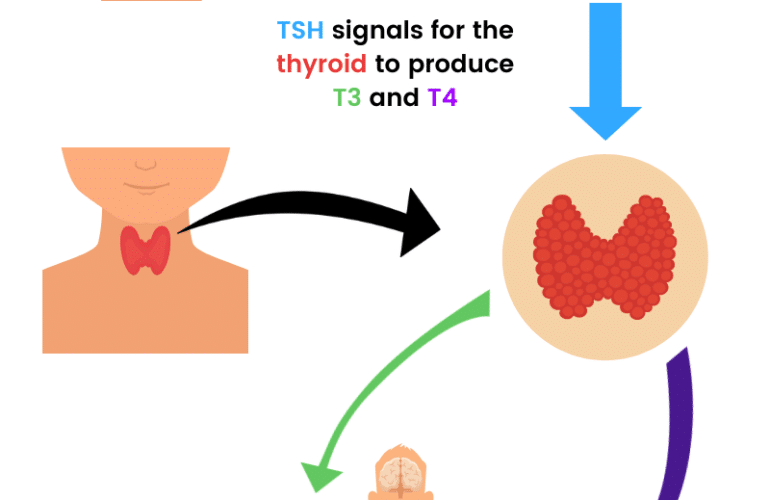
Autoimmune Thyroid Disease and Fertility: Diagnosis, Treatment, and IVF Success Strategies

Comprehensive Guide to Herbal Supplements for Fertility: Evidence, Dosage, and Safety
